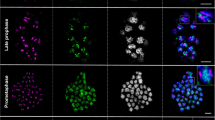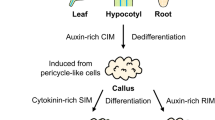Summary
A permanent dicentric chromosome system was studied on carrot cultures and regenerated somatic embryos at different stages of development. The large chromosomal variability of the cultures and the presence of the breakage-fusion bridge cycle did not interfere with the initial developmental process up to the seedling stage but subsequent growth proceeded only if healing of the broken ends or dicentric loss had occurred. The behaviour of the dicentric chromosome in culture and during somatic embryogenesis is discussed in relation to chromosomal variability, abnormal development and the somaclonal variation that such mechanisms may generate in regenerated plants.
Similar content being viewed by others
References
Bayliss MW (1975) The effects of growth in vitro on the chromosome complement of Daucus carota (L.) suspension cultures. Chromosoma 51:401–411
Burk LG, Chaplin JF (1980) Variation among anther derived haploids from a multiple disease resistant tobacco hybrid. Crop Sci 20:334–338
Darlington CD, Wylie AP (1953) A dicentric cycle in Narcissus. Heredity Suppl 6:197–213
Grout BWW, Crisp P (1980) The origin and nature of shoots propagated from cauliflower roots. J Hortic Sci 55:65–70
Larkin PJ, Scowcroft WR (1981) Somaclonal variation — a novel source of variability from cell cultures for plant improvement. Theor Appl Genet 60:197–214
Lo Schiavo F, Giovinazzo G, Terzi M (1983) 8-azaguanine resistant carrot cell mutants and their use as universal hybridizers. Mol Gen Genet 192:326–329
McClintock B (1941) The stability of broken endes of chromosomes in Zea mays. Genetics 26:234–282
McClintock B (1942) The behaviour of “unsaturated’ broken ends of chromosomes. Yearb Carnegie Inst Wash 41:181–183
McWilliam AA, Smith SW, Street HE (1976) The origin and development of embryos in suspension cultures of carrot (D. carota). Ann Bot 38:243–250
Novak FJ (1980) Phenotype and cytological status of plants regenerated from callus cultures of Allium sativum L. Z Pflanzenzücht 84:250–260
Nuti Ronchi V (1981) Histological study of organogenesis in vitro from callus cultures of two Nicotiana species. Can J Bot 59:1699–1977
Nuti Ronchi V, Nozzolini M, Avanzi L (1981) Chromosomal variation on plants regenerated from two Nicotiana spp. Protoplasma 100:433–444
Nuti Ronchi V, Caligo MA, Nozzolini M, Luccarini G (1984) Stimulation of carrot somatic embryogenesis by proline and serine. Plant Cell Rep 3:210–214
Sears ER, Camara CA (1952) A transmissible dicentric chromosome. Genetics 37:125–135
Shepard JF, Bidney D, Shahin E (1980) Potato protoplasts in crop improvement. Science 28:17–24
Steeves TA, Sussex IM (1972) Pattern in plant development. N.S. Prentice-Hall's Inc, Foundation of Developmental Biology, Englewood Cliffs
Vergara MR, Biasini G, Lo Schiavo F, Terzi M (1982) Isolation and characterization of carrot cell mutants resistant to α-amanitin. Z Pflanzenphysiol 107:313–319
Author information
Authors and Affiliations
Additional information
Communicated by R. Riley
Rights and permissions
About this article
Cite this article
Toncelli, F., Martini, G., Giovinazzo, G. et al. Role of permanent dicentric systems in carrot somatic embryogenesis. Theoret. Appl. Genetics 70, 345–348 (1985). https://doi.org/10.1007/BF00273737
Received:
Accepted:
Issue Date:
DOI: https://doi.org/10.1007/BF00273737




